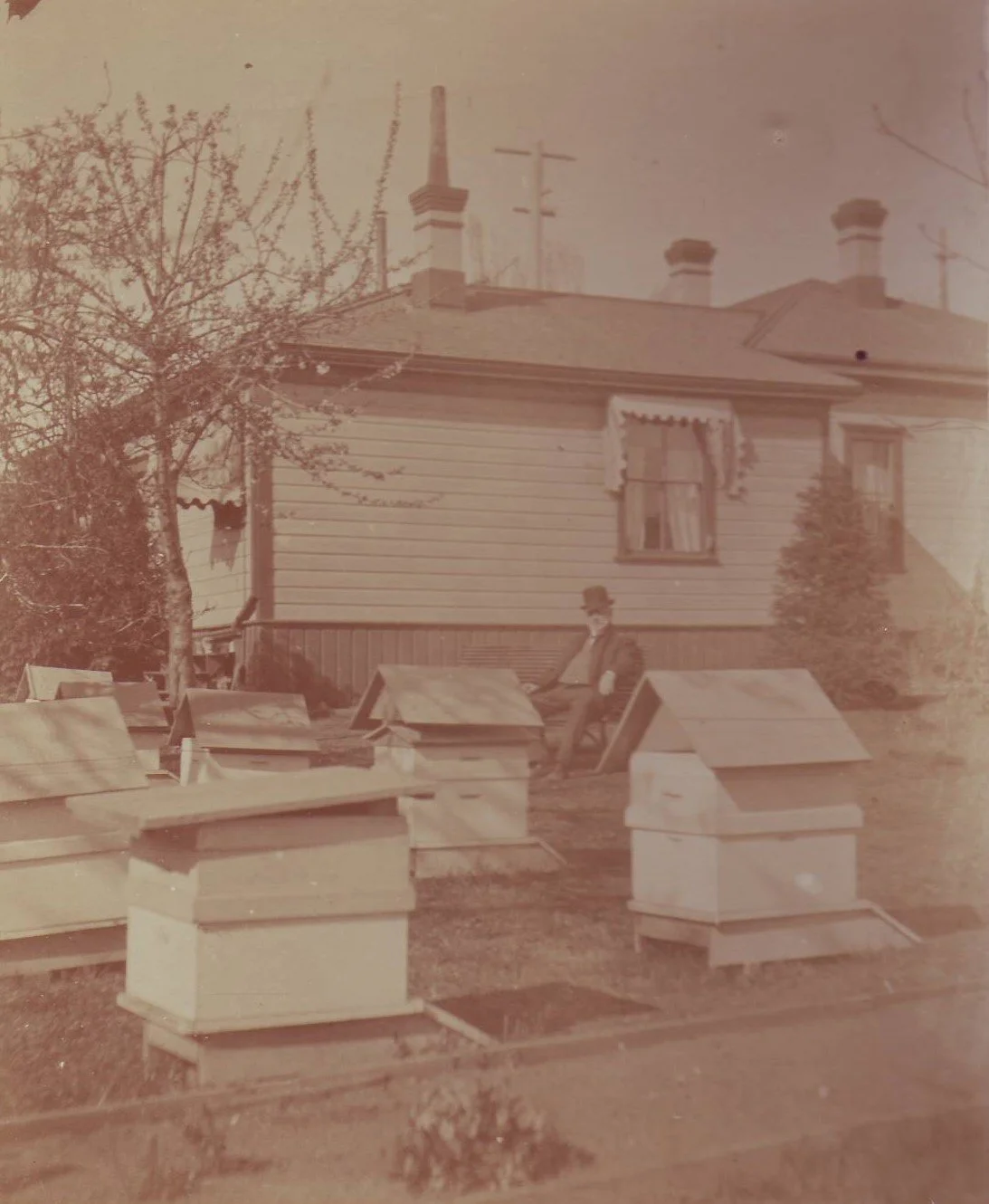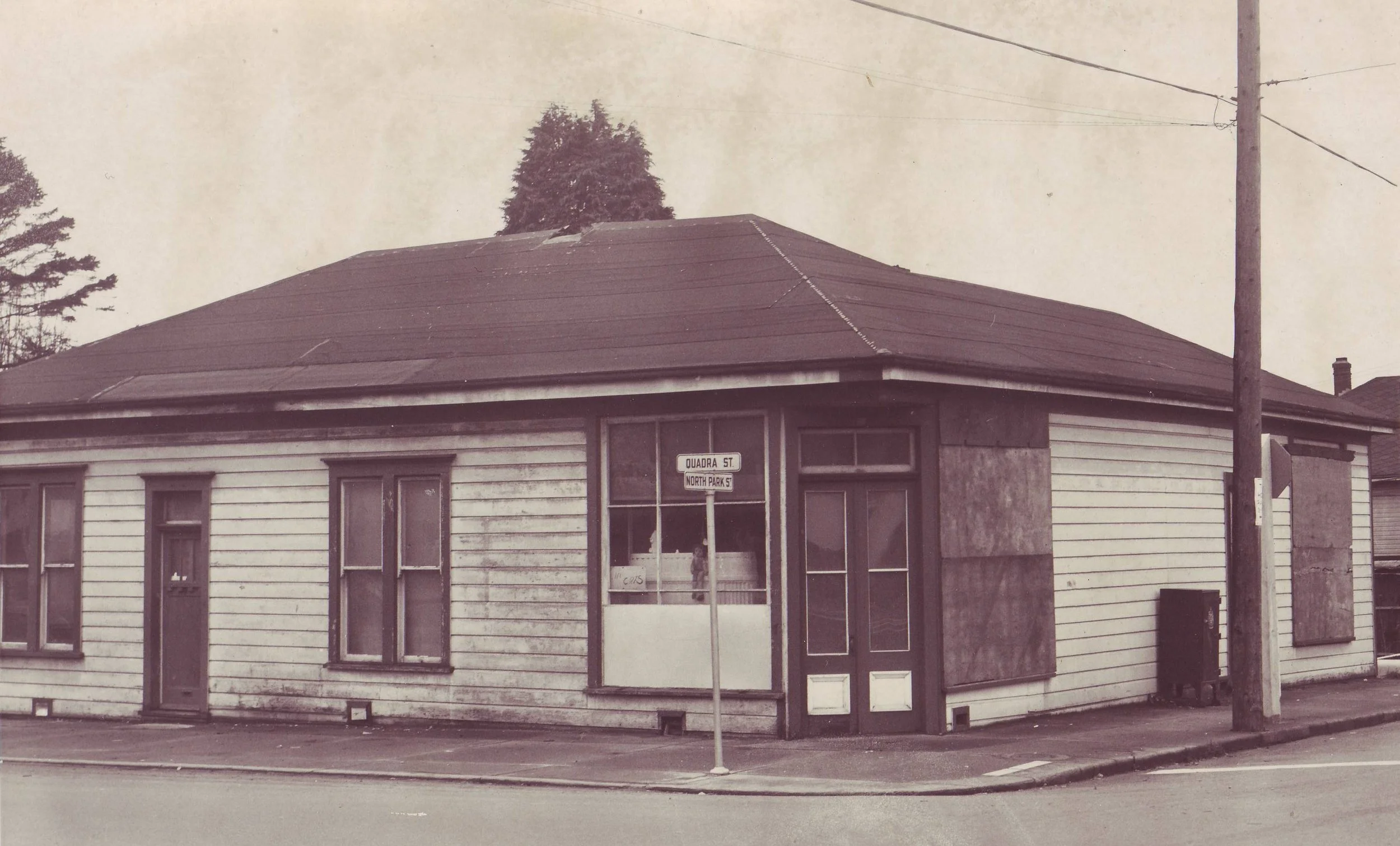Things That Go Bump in the Night – the Ghost of the Ward Store
The old store at the corner of Quadra and North Park Streets, for 80 years a Victoria landmark, is long gone, another victim of progress. But it wasn’t forgotten by its former owners who cherished memories of barley sugar sticks, hooped skirts, hand-blended teas–and of locked doors that slammed in the night when no mortal walked its darkened hallways.
* * * * *
The John Ward store as it appeared in its heyday. —Author’s Collection
The late George and Madeline Larrigan lived in the store for years and, later, even had kind words for the invisible tenant with whom they shared residence.
In fact, so strongly did they become attached to their “ghostie,” that they invited it to join them when they moved to their new water-view home in Oak Bay, where I met and interviewed them.
Their invitation, as it turned out, might well have been accepted!
* * * * *
The store dated back to 1874 when John Ward, his three sons and three daughters came west from Winnipeg, setting up shop in the single-storey frame dwelling then known as 124 Quadra Street. In later years the popular establishment was listed as 120 Pioneer Street (now North Park), then 1728 Quadra.
”It was rather a general store, inasmuch as it had groceries and dry goods,” recalled Mr. Larrigan. “Later on, in 1900, they extended the house, putting on three more rooms, and extended the store another 25 feet. That's when they moved the grocery store back and gave themselves more room for dry goods.
“At one time they even had toys in that store. But that went by the boards when the department stores, such as David Spencer's, went into the toy end of it."
At the time of my interview, many Victorians would have remembered the Ward family: John Sr., in fine white beard; spinster daughters Fanny, Agnes and Elizabeth, whose sweeping skirts and high-boned collars defied changing fashions; and the brothers Henry, Arthur and John William Ward.
Of the six, only Mr. Larrigan's grandfather, John, married, moving to Gastown until the disastrous fire which swept Vancouver's predecessor from the forest floor.
The old store was typical of the period, with its tall, graceful glass jars filled with penny candy such as barley sticks and molasses humbugs; deep bins containing rice, tapioca and sago; barrels brimming with flour and sugar, all measured by hand. Then there were fresh eggs and honey from the chickens and bees kept in the garden, and choice teas, blended by John Ward himself.
The dry goods section advertised a full range of goods, from bolts of imported laces to ladies’ lingerie.
You couldn’t buy fresher eggs and honey than those from the store’s own backyard. —Author’s Collection
“I haven't seen anything like them since,” Mr. Larrigan said of the store’s ornate furnishings, including large showcases with glass doors that “slid on old fashioned metal tracks with wheels which you could hear squeaking as they ran along,” and the counter of thick cedar which was all of 22 feet long.
When the venerable premises were razed in 1976, the provincial government bought most of the fittings “for one of their historic projects, I understand,” he said.
Over the years, brothers and sisters followed John Ward in death until Henry was the sole survivor. One of Victoria's earliest mailman, he ‘d walked the James Bay route when Noah Shakespeare was postmaster. When the store finally closed, about 1940, Henry remained in the living quarters until his death at 92.
Earlier, Mr. Larrigan and his mother had moved in "so that we could look after him. So then, of course, when Uncle Henry passed on, that left just my mother and myself."
The old store as it looked after the Larrigans moved out. —Author’s Collection
With his mother's passing, he and Madeline were married, living in an apartment until the day she suggested they renovate the old store and move in. "So we went on a campaign of painting, sawing and hammering, and we did the place all out. Took the four rooms down one side and made it like an apartment, painted it all out, changed the colours, put linoleum on the floors, then put carpets down.”
“And we really pioneered," he chuckled, remembering the old-fashioned wood-coal stove.. We had many happy times in the old place.
"Besides the store’s furnishings and stove, another original feature was the garden, which had been laid out by John Ward years before and was faithfully maintained until the Larrigans moved in 1964.
Apparently Mr. Larrigan's mother had been the first to notice “peculiar goings-on.”
More than once she’d complained of “people walking around in the other rooms in the house and slamming doors." However, because of her age and health, Mr. Larrigan had dismissed her complaints as her imagination.
“I just let it go... Then, when Madeline and I moved into the house, I didn't mention it to her because I still thought that this carrying-on business was something that my mother had dug up because of her age and the fact that she wasn't very well towards the end.”
He was soon to have second thoughts on the subject!
“One afternoon, Madeline was having a lie-down in the bedroom. I had told her from the very beginning, ‘Now be sure and keep that door locked,’ because the front door was right on the street, there was a bus stop right outside, and somebody could open the door and walk in."
Upon arriving home from work that evening, he’d found Madeline “not upset, but she was concerned."
At the time of my interview, she vividly recalled that afternoon. “I was lying down that afternoon, and all of a sudden, I woke up and I could hear shuffle-shuffle-shuffle across the kitchen linoleum."
Grabbing “something to protect myself with,” she’d tiptoed to the kitchen, to hear a door slam in another room. "But when I went to investigate the doors were all locked."
The rest of the afternoon passed without further incident, and upon George's return, she told him of her uncanny experience. It was then that he informed her of his mother's complaints. "I had to believe then that something was going on," he said.
On another occasion, they’d been visiting friends, leaving daughter Marlew alone. "When we came back, she was in quite a sweat, " recounted Mr. Larrigan. "She was sitting in the sitting room, very much concerned. She said that she had heard people talking and walking around in the front bedroom, and she had kept all the doors locked. But that passed off."
A similar episode occurred sometime later. As before, the senior Larrigans were visiting. But this time, Marlew wasn’t alone, being accompanied by her future husband, Larry Shipley. “We went out the front door just as Larry went along to the bathroom to wash his hands. And we'd already gotten away in the car when, supposedly...the [front] door opened and closed, somebody came tramping down the hall, and Larry says, ‘Oh, your mother's forgotten something. I bet she forgot her cigarettes.’
“But nobody came through the front door and [Larry] was 6'2, 200 pounds and a real husky football player, so he wouldn't let anybody get in his way. We had many other little things like that happen..."
The list of ‘little things’ extended over a six-year period. There was the night three glass coasters fell, for no earthly reason, in the pantry. Other phenomena included the shuffling of feet across the floor, sounds like someone was playing with the drawer pulls of a desk, and like someone was rolling something on the floor, over and over, “like a cat chasing a marble”.
They’d never been bothered by mice, they added.
Like the restless spirits of fiction, the Larrigans’ boarder from another world followed no established pattern of time, location or sound. Sometimes months passed between disturbances. However, during negotiations to sell the house, “all hell broke loose."
Such as the night the coasters fell—or were dropped—from a pantry ledge.
“For a while there, it was quite frequent, like the doors and everything all happened within a month," said Madeline. "At first it was the flicking of the handle, then the marble dropping. Wasn't that a strange way for a ghost to act, don't you think?
“But as God is my judge, that marble was just like someone picked it up and dropped it."
Asked if they'd ever seen the ghost, or its activity such as a door opening, she mournfully replied, “No. Usually, it was at night. I wanted to see what it was. but I never did."
“I tried to take a practical view of the thing," added George, describing the morning Madeline heard what sounded like the hinged metal handles of a dresser being raised and dropped, time and again. He’d investigated carefully, to arrive at the definite—if uncomfortable—conclusion that wind blowing through a partially open window couldn't lift the door handles.
“And wherever that ‘marble’ was, I never found it. And locked doors slamming...it had to be something unusual.”
But if the Larrigans never saw their ghost, they did form an opinion as to the identity of whom they affectionately dubbed, " the bearded one. "
“The only conclusion we can draw, after Madeline described it to me, is that this was Uncle Henry.
“I can remember Uncle used to shuffle around in carpet slippers and very rarely put shoes on. When you get to be about 90, you don't go high-balling along quite so fast as you do it 16.... And that's how Madeleine described the sound."
Perhaps this is why they never feared their invisible tenant(s) after the first incident. As to why Henry Ward would remain at the old homestead years after crossing the eternal divide, Mr. Larrigan shrugged, " Well, I think it was the place he was used to; it was familiar."
To which Madeline chuckled, “He may have wanted to see how I was treating George."
They moved to Beach Drive in 1964 and the old store which had known six generations of Wards was demolished two years after. What became of Uncle Henry?




